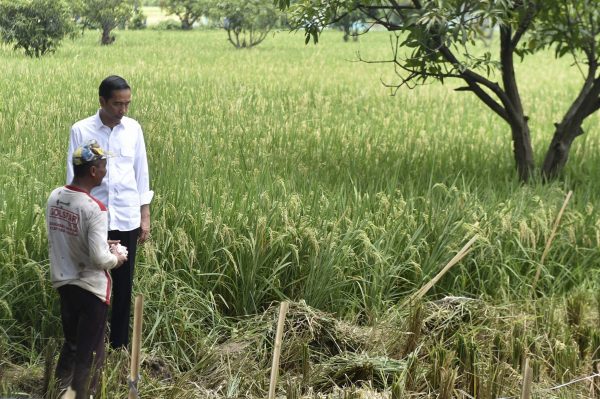This dream of food self-sufficiency and the need to provide affordable food for a growing population in a globalised and increasingly urban economy are often in conflict.
All of Indonesia’s presidents, both the autocratic and the democratically elected, have found food politics to be a headache. Two decades of public opinion polling following the fall of Suharto show one key point of constancy in the political tastes of Indonesian voters: the price of basic foodstuffs is critical in determining their confidence in the government of the day.
Indonesian presidents let food inflation get out of hand at their peril. As President Joko Widodo (Jokowi) shifts into campaign mode in the lead up to the April 2019 presidential elections, he too is widely known to be privately worried about the threat of food price spikes ahead of voting day. He ought to be concerned.
As Rainer Heufers and Arianto Patunru make clear in this week’s lead article, Indonesian food policy remains confused. The confusion is an awkward mix of both commitment to the ideal of food sovereignty and hypersensitivity to voters’ expectations that basic foodstuffs should remain affordable. Achieving the second objective is made near-impossible, say Heufers and Patunru, by the fundamental problem that ‘Indonesia’s political leadership largely ignores the importance of imports for food security and believes incorrectly that food insecurity comes from a dependence on imports’.
‘When domestic [food] prices soar and the government finally agrees to import food, importers have to go through a complex licensing process that involves several government authorities’. The kickbacks and graft that mark the food importation regime have given rise to some of Indonesia’s most notorious corruption scandals in recent years.
The upshot is that Indonesian consumers are paying significantly more than they should for basic foodstuffs compared to their counterparts even in wealthier ASEAN countries. ‘These price premiums “taxed” Indonesian consumers approximately US$98 billion between 2013 and 2015’, Heufers and Patunru calculate. This is money that Indonesian households could better spend on other needs.
The destiny of development and structural change in the Indonesian economy, as it was for other East Asian emerging economies, is for food imports to play a growing role in food security. As incomes rise in non-agricultural activities, the cost of delivering affordable food from domestic suppliers is driven up, making food imports more attractive. These imports mean foodstuffs are more available, at more affordable prices, to ever larger urban populations as well as the agricultural poor. High food prices would also necessitate investment to lift supply and lower costs in the domestic agricultural sector, especially in provinces where land remains more abundant. But Indonesia’s own economic success implies a steady lift in food import dependence.
The need is clear for an alternative food policy approach — one that recognises the natural role that food imports play in ensuring food security and affordability. President Jokowi is well placed to bring the public with him in shifting to a more rational food policy. He has the trust and goodwill of the low-income Indonesians who struggle with food inflation, and he has proved himself able to pull off reforms previously thought politically impossible.
Prominent among these is Jokowi’s success in slashing Indonesia’s notoriously wasteful fuel subsidies shortly after he was elected president in 2014. In the weeks and months leading up to the withdrawal of subsidies, the President explained to the Indonesian public, in easy-to-understand terms, the need to shift from a ‘consumptive’ to ‘productive’ subsidy regime. Once the fuel subsidy was removed, consumers quickly adjusted and public funds have been released for substantial new investments in infrastructure and the social security system.
A similar commitment to selling the public on the benefits of reform and on a determination to see the political process through could well be brought to bear on the issue of food policy. Gradual reform to the tariff and import licensing regimes could be combined with investment in rural infrastructure and targeted subsidies to raise the productivity of Indonesian farmers. As Heufers and Patunru note, rural households benefit from lower food prices: two-thirds of them are net food consumers, and research from 2008 revealed that even most rice-farming households are net consumers of rice.
Certainly, the President’s political adversaries would encourage a nationalist backlash that accused Jokowi of selling out Indonesian farmers and national pride. But there is every reason to believe that a president who stays the course on food policy reform will survive, politically speaking, to reap the political rewards once consumers start to notice their rupiah are going further at the local market.
Those who decry most loudly the presence of imported foodstuffs in Indonesian markets are typically not the people who need to worry how to afford their next meal. Fretting about the provenance of one’s food is a preoccupation of more affluent voters, and they are outnumbered by those more concerned with price and availability.
As Jokowi turns his mind to the policy challenges in his second term (on current polling, a likely scenario) he could do worse than focus on getting Indonesia’s food policy right. That would strike a blow for a healthier and more productive economy and society — and done smartly, it could be good politics as well.
The EAF Editorial Board is located in the Crawford School of Public Policy, College of Asia and the Pacific, The Australian National University.

